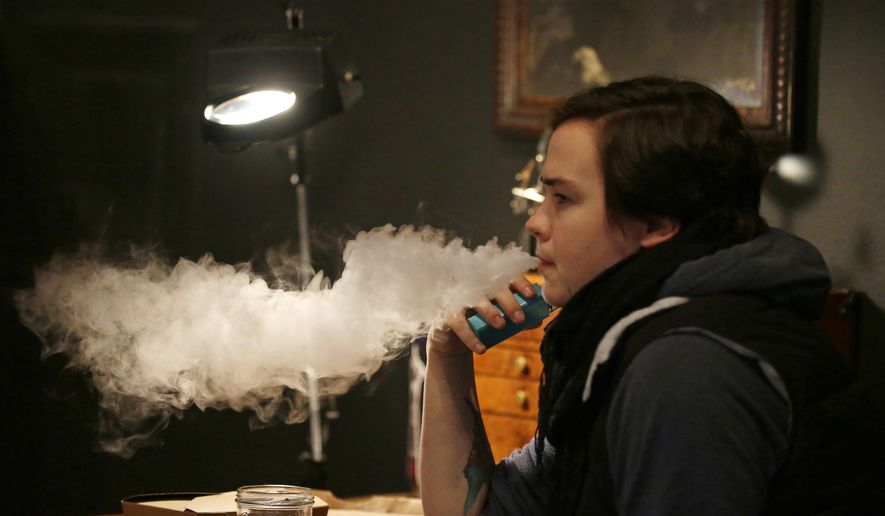The Food and Drug Administration announced Tuesday that it raided Juul Labs last week and seized more than a thousand documents on the e-cigarette maker’s marketing and sales strategy and information on its product design as it appeals to youth.
The surprise inspection, at Juul’s headquarters in San Francisco, followed an April announcement by the FDA requesting the company provide documents on its product’s appeal to young people. Similar requests were made to four other e-cigarette companies in May.
A Juul e-cigarette most closely resembles a sleek thumb drive and comes with interchanging pods filled with a salt-based nicotine liquid in a variety of flavors like mint, cucumber and creme brulee.
E-cigarette use among teenagers is increasing, even as cigarette smoking has decreased. About 11.7 percent of high school students and 3.3 percent of middle school students used e-cigarettes in 2017. In 2016, an estimated 7.6 percent of high schoolers were cigarette smokers.
An FDA spokesman said Friday’s inspection was to determine if Juul is complying with all applicable agency laws and regulations.
“We see an opportunity for e-cigs to help adult smokers quit cigarettes and reduce their health risks; but we’ve said all along it can’t come at the expense of hooking kids on these products,” tweeted FDA Commissioner Scott Gottlieb. “We’re taking actions to address youth appeal and access to e-cigs.”
Juul CEO Kevin Burns said in a statement that company officials had a “constructive and transparent dialogue” with the FDA during the inspection and that the company has released since April about 50,000 documents related to sales, marketing and efforts to keep its product out of the hands of young people.
“We want to be part of the solution in preventing underage use, and we believe it will take industry and regulators working together to restrict youth access,” Mr. Burns said.
Last month, the FDA announced it instituted fines and sent more than 1,300 warning letters to retailers who illegally sold five e-cigarette products to underage buyers in brick-and-mortar stores and via websites. The targeted products were: Juul, Vuse, MarkTen XL, Blu and Logic.
The FDA also sent letters to the five companies on Sept. 12, requesting they submit within 60 days plans on how they will prevent young people from using e-cigarettes.
Juul Labs maintains that it conducts routine checks on its retailers to test if they are identifying the age of purchasers and have an age-verification system on their websites for online purchases. The company also made $30 million available to “independent research, youth and parent education and community engagement” on e-cigarettes.
Juul is identified as one of the leading contributors the increase in e-cigarette use among young people, who refer to the use of the product as a distinctive form of vaping called “Juuling.”
The FDA also is weighing the option to ban flavors in e-cigarettes, identified as one of the main reasons for youth initiating e-cigarette use. A survey by the Centers for Disease Control and Prevention found that 31 percent of middle and high school students use e-cigarettes because they come in flavors like mint, candy, fruit and chocolate.
Juul e-cigarettes, which were first marketed as PAX from 2015 to 2017, have exploded in sales over the past three years, exceeding more than $650 million in annual retail sales, according to researchers from Georgia State University’s School of Public Health.
The researchers, who published their results in the journal Tobacco Control in May, found that Juul’s sales growth was dominated by a “variety of innovative, engaging and wide-reaching campaigns on Twitter, Instagram and YouTube, conducted by Juul and its affiliated marketers” at a relatively low cost to the company.
Juul spent about $2.1 million on traditional advertising, compared to the second most popular e-cigarette maker Vuse, which spent an estimated $16 million.
The high nicotine content of Juul products is particularly worrying to health officials, and the health risks from aerosols produced by vaping devices are not yet fully understood.
“There are no redeeming benefits of e-cigarettes for young people,” said Dr. Corinne Graffunder, director of CDC’s Office on Smoking and Health, in a statement. “The use of certain USB-shaped e-cigarettes is especially dangerous among youth because these products contain extremely high levels of nicotine, which can harm the developing adolescent brain.”
• Laura Kelly can be reached at lkelly@washingtontimes.com.




Please read our comment policy before commenting.